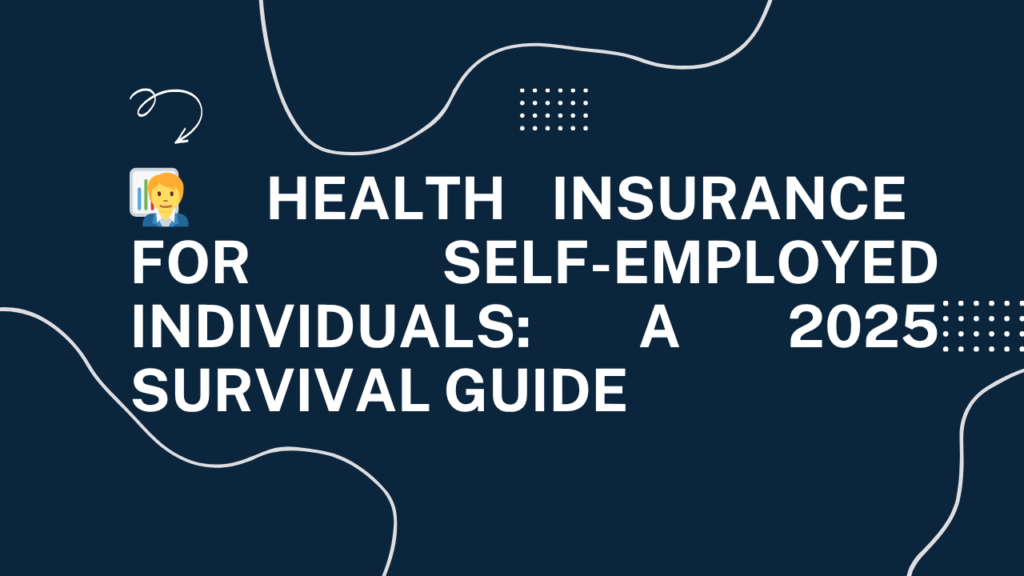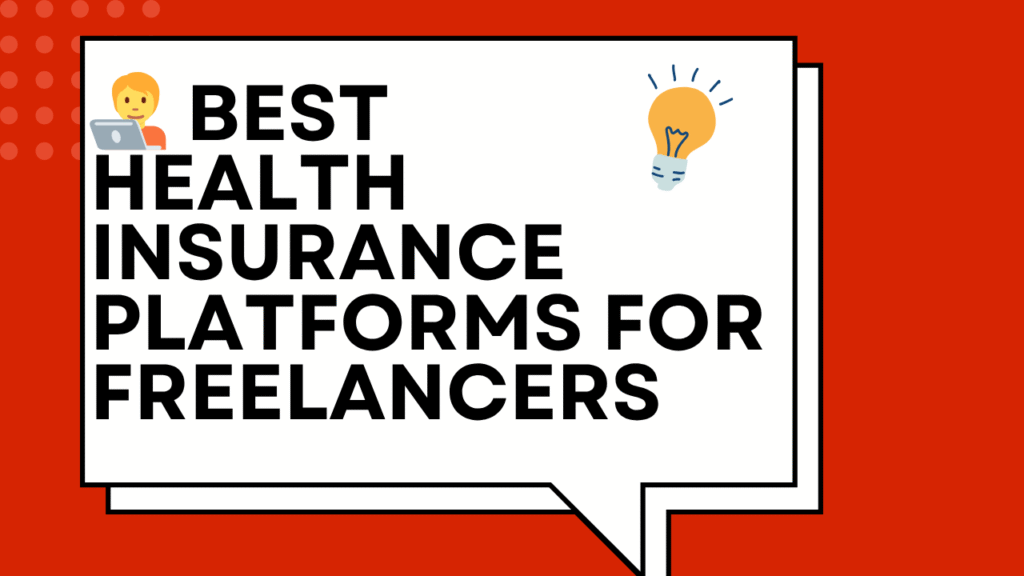🧑💼 Health Insurance for Self-Employed Individuals: A 2025 Survival Guide
Being your own boss gives you freedom—but it also comes with responsibilities, especially when it comes to health insurance.
Unlike traditional employees, freelancers, gig workers, and small business owners don’t get coverage through a company. That means it’s up to you to find, fund, and manage your own plan.
This 2025 guide will help you understand your options, compare costs, and choose the right self-employed health insurance plan—without breaking the bank.

📌 Table of Contents
- Why Health Insurance Is Crucial for the Self-Employed
- Your Health Insurance Options in 2025
- How to Find Affordable Plans
- Key Terms and What to Look For
- Best Health Insurance Platforms for Freelancers
- Tax Benefits for Self-Employed Health Insurance
- Common Mistakes to Avoid
- Final Thoughts + CTA
💡 Why Health Insurance Is Crucial for the Self-Employed
Even if you’re young and healthy, one accident or illness can lead to massive medical bills. Without employer-sponsored insurance, you’re 100% responsible for:
- Premiums
- Deductibles
- Co-pays
- Full medical costs if you go uninsured
💸 A single ER visit or surgery can cost more than your annual income.
Plus, being uninsured can make you ineligible for important tax benefits and prevent you from accessing preventive care.
🏥 Your Health Insurance Options in 2025
Self-employed individuals have several choices for coverage. Let’s break them down:
1. Marketplace Plans (Affordable Care Act)
- Found on HealthCare.gov or state exchanges
- Premium subsidies available based on income
- 4 tiers: Bronze, Silver, Gold, Platinum
- Open enrollment: Nov–Jan (with exceptions for qualifying events)
2. Private Health Insurance
- Purchased directly from insurers (outside of marketplace)
- More flexibility, but no income-based subsidies
- Ideal for those who don’t qualify for ACA help
3. Health Sharing Ministries (Not Insurance)
- Community-based cost-sharing
- Lower premiums, but fewer protections
- Not regulated by insurance laws
4. Short-Term Health Insurance
- Limited-time coverage (up to 12 months)
- Lower premiums, higher risk
- Doesn’t cover pre-existing conditions or essential benefits
5. Group Plans Through Associations or Freelance Unions
- Organizations like Freelancers Union or chambers of commerce
- Access to discounted group rates
🧠 Always check if your income qualifies you for subsidies on ACA plans.
💰 How to Find Affordable Plans
Use these strategies to keep costs low:
- Compare multiple quotes using platforms like eHealth, PolicyGenius, or HealthCare.gov
- Opt for a higher deductible if you’re healthy and rarely visit the doctor
- Choose a Silver plan if you qualify for cost-sharing reductions
- Use preventive care (included for free in most plans)
Estimated Monthly Premiums (2025, for single adult):
| Plan Type | Monthly Cost (with subsidy) |
|---|---|
| Bronze | $0–$150 |
| Silver | $80–$300 |
| Gold | $200–$450 |
| Private Plans | $250–$600+ |
📄 Key Terms and What to Look For
| Term | What It Means |
|---|---|
| Premium | Monthly payment to keep your policy active |
| Deductible | Amount you pay before insurance covers services |
| Out-of-Pocket Max | Max you’ll pay in a year before insurance pays 100% |
| Copay/Coinsurance | Your share of medical costs after deductible |
| HMO vs. PPO | HMO = limited network, PPO = more flexibility |
📌 Balance premium cost with deductible and out-of-pocket maximums.

🧑💻 Best Health Insurance Platforms for Freelancers
Top Picks for 2025:
| Platform | Best For |
|---|---|
| HealthCare.gov | Government plans with subsidies |
| PolicyGenius | Fast quote comparisons |
| Stride Health | Gig workers, Uber drivers |
| eHealth | Private plans & Medicare |
| Catch | ACA + auto tax withholding |
Most let you filter by monthly cost, deductible, network, and prescriptions.
🧾 Tax Benefits for Self-Employed Health Insurance
You may be eligible to deduct 100% of your health insurance premiums—if:
- You report income from self-employment
- You’re not eligible for employer-sponsored plans (e.g., via spouse)
You can also deduct:
- HSA (Health Savings Account) contributions
- Medical expenses (if they exceed 7.5% of your income)
💡 These deductions can significantly reduce your taxable income.
❌ Common Mistakes to Avoid
- Choosing the cheapest plan without checking the deductible
- Not understanding your coverage limits or exclusions
- Missing open enrollment deadlines
- Ignoring tax benefits or failing to claim deductions
- Going uninsured and risking catastrophic costs
🚀 Final Thoughts
Health insurance isn’t optional—it’s a critical part of staying financially stable as a self-employed person.
With the right plan, you can focus on growing your business without worrying about surprise medical bills. And with proper tax planning, it’s more affordable than most people think.
👉 Ready to Get Covered?
Visit HealthCare.gov or PolicyGenius to compare 2025 self-employed plans today. Lock in your coverage, claim your tax benefits, and protect your hustle.
Because your health is your business’s best asset.